This House believes that Muslim women should be free to marry anyone they choose
Monday May 25 2009
MOTION PASSED
by 62% to 38%
Transcript
Order of speeches

- Introduction
- Asra Nomani
- Yasir Qadhi
- Muhammad Habash
- Thuraya Al Arrayed
- Audience questions
- Vote result
Introduction
 TIM SEBASTIAN
TIM SEBASTIAN
Ladies and gentlemen, a very good evening and welcome to the last in our fifth series of Doha Debates coming to you from the Gulf state of Qatar and sponsored by the Qatar Foundation. At some time or other, everyone wants a say about marriage. In the Islamic world it is governed by a range of institutions and traditions - religion, law, family, culture, even politics - and somewhere on the list love gets a look-in as well. But should a woman be free to marry who she chooses, or is it right that she should submit to other considerations? Do any or all of them outweigh personal choice about this most intimate of human relationships? Our motion tonight is that Muslim women should be free to marry anyone they choose, and we have four Muslims on our panel who'll argue from very different points of view. Speaking for the motion, Asra Nomani, a writer and activist and the author of Standing Alone: an American woman's struggle for the soul of Islam. She's worked as a journalist, and in 2003 she challenged the rules at her mosque that required women to enter and pray in separate areas. With her, Muhammad Habash, a Muslim cleric and a member of the Syrian parliament. He leads Friday prayers at the Al-Zahraa mosque in Damascus, and is director of the city's Islamic Studies Centre. Against the motion, Yasir Qadhi, an American Muslim cleric who lectures throughout the English-speaking world. He studied at the Islamic University of Medina. He's an instructor at the Al Maghrib Institute and appears regularly on Islamic satellite channels. And with him, Thuraya Al Arrayed, a Saudi writer, columnist and poet. Her articles tackle current and controversial issues - maybe not quite as controversial as this one - and she is a member of the Arab Thought Foundation. Ladies and gentlemen, our panel. So now let me first call on Asra Nomani to speak for the motion.
Asra Nomani
Speaking for the motion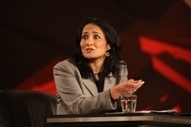
ASRA NOMANI
Thank you. Thank you so much for the honour of having me come to talk to you. This is a topic that I have meditated on for all of my adulthood. When I was a girl, at the age of 18, reaching adulthood, I confronted the barriers that just about every Muslim woman internalises: that she doesn't have the right to choice when it comes to marriage. And I am here as a 43-year-old woman now to tell you that I do not wish for any of the women that are here now, or any other women in our Muslim world to know the suffering, the loneliness, the loveless marriages, and the forced marriages that oftentimes come out of situations where a woman cannot make her own choice. To me this is equivalent to the days of jahiliya when it was an age of ignorance and we buried our daughters alive. When we don't allow our daughters to choose who they are going to spend the rest of their lives with, we essentially kill their spirits. We essentially bury them alive and to me this is not Islamic. In Islam we are clearly told there is no compulsion in religion. We do not have to agree with each other's choices, but everybody has free will, everybody has the choice to make their decisions about their lives. Islam is a religion that believes in critical thinking. We're going to hear a lot of the theological arguments tonight, that lay the barriers for women, that become the barriers around our heart. But what I would argue is that there are dissenting opinions. There are dissenting opinions, and we can use our minds, this concept of ishtihad or critical thinking to challenge consensus opinions that have denied women their rights in the most intimate place in our lives: our hearts and our bodies. And finally we have to remember that religion is not meant to bring about suffering. Religion is meant to lift our spirits. Marriage - what is it? It's about love, it's about passion, it's about kinship. All of our daughters of Islam deserve this, all of them deserve to make their own choices about their destiny. It took me 25 years. I went into a marriage that I thought would make my family happy, and I could not fool myself when I lay my head to bed at night, because in that most intimate place, it is you alone who lies there. It is not your family, it is not your tribe, it is not your country. Every night I cried myself to sleep, and I could not stay in this marriage because I knew that I, as a Muslim woman, had a right to happiness, and my salvation came because my family gave me the greatest message that there is, which is that we respect you, we have mercy on you, and we honour your own choice. This is what we should do for our daughters in Islam, we should allow them the right to choose whom they can marry and that right should extend to anyone.
TIM SEBASTIAN
Asra Nomani, thank you very much indeed. Isn't it because women's rights have been abused in many parts of the Islamic world, that you need the protection of Islam, you need the protection of family, you need the protection of governments, you need them to have a say in the marriage process? They provide that extra protection that you seem to be calling for.
ASRA NOMANI
I wish they did, but the truth of the matter is that we know that so many cases are in fact impositions of the family and the culture. There is so much racism...
TIM SEBASTIAN
In Gulf governments, for instance in Qatar, you have a government official who will sit with a woman before the marries, talk to her if necessary without the family, to make sure that she is entering the marriage of her own free will. That's the kind of protection you would approve of, isn't it? ASRA NOMANI
ASRA NOMANI
But he's not going to be in the bedroom, is he, for the next 50 years?
TIM SEBASTIAN
We're not talking about that, we're talking about the state providing protection. If you want it on the one hand, you can't exclude them from the marriage process on the other, can you?
ASRA NOMANI
You can because ultimately the state is not going to be in the marriage. It is only that woman that's going to be in the marriage.
TIM SEBASTIAN
But you want the state to pick up the pieces if something goes wrong, don't you?
ASRA NOMANI
We want the state to be able to protect the equal rights of the women in divorce, in issues of assault, in issues of alimony, in issues of custody.
TIM SEBASTIAN
So you want them but you don't want them. You want the family to provide support if something goes wrong, don't you? You want them to provide the safety net as well, and yet you're saying ‘stay out of the decision-making process'.
ASRA NOMANI
I'm a mother, I have a son, and trust me, I wish only well, just like the state, just like the family, everybody in this room, everybody on this panel I know has the best intentions, but at the end of the day, what I argue is that the choice rests with the woman.
TIM SEBASTIAN
And choice is so good, no lonely, loveless marriages in the West where you have all the choice that you want?
ASRA NOMANI
The choices ...
TIM SEBASTIAN
And no safety net either?
ASRA NOMANI
The choices bring about cost, there's no doubt, and with rights come responsibilities, and there comes a need, there is a very important need to be wise, but ultimately the counsel of family can only go so far, it cannot dictate to a girl what she should do.
TIM SEBASTIAN
All right, Asra Nomani, thank you very much indeed.
ASRA NOMANI
Thank you.
TIM SEBASTIAN
All right, now let me ask Yasir Qadhi to speak against the motion please.
Yasir Qadhi
Speaking against the motion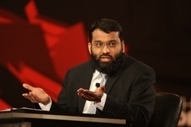
YASIR QADHI
Thanks, Tim. I begin by praising God and sending salutations upon the messengers of God. The motion up for debate asks us to allow Muslim women the freedom to marry whomever they please. I'm against this motion because it is inherently illogical and self-contradictory. A Muslim literally translates as one who submits - meaning to the laws of God - therefore a Muslim, regardless of the gender, is completely free to marry within the allowances of those laws. If they contravene those laws, then by definition they are not submitting, in other words they are not exemplifying faithful Muslims. Now, this is not to deny the very real problems of our society, some of which Asra referred to: forced marriages, tribal and cultural prejudices, unjustly prevent women from getting married. It is an undeniable fact that women are oppressed in many parts of our world, sometimes in the name of our religion. We all agree sitting here that there's a serious problem, that sometimes in the name of the religion, Muslim women are being subjugated. However, I'm arguing that those subjugations are cultural norms that many times oppose Islamic law, and I admit that sometimes Islamic clerics themselves, as part of their culture, propagate those norms and exacerbate the problem rather than solving them, but I remind you that the motion is not arguing for greater freedom for women's rights. If it were, I would be a supporter of the motion. Rather it is arguing for unconditional freedom and that is why I oppose it. A Muslim woman cannot marry a non-Muslim man, neither can a woman marry another woman, and of course let us not forget that Islamic law also puts restrictions on men as well. The point is that if a man or woman wishes to identify with Islam, if they want to call themselves Muslims, there are some boundaries for that definition. Anyone who argues for ultimate freedom is arguing to destroy those boundaries. In conclusion, this motion makes just about as much sense as someone who says Muslim men should be given the freedom to drink anything they want, including alcohol. We all agree there's a problem, there is a serious problem. The solution to this problem lies not in rejecting the prophetic message, especially if we call ourselves Muslims. The solution lies in rediscovering the true prophetic message, in educating the people about it, and in properly following it. Thanks a lot.
TIM SEBASTIAN
Yasir Qadhi, thank you very much indeed. If a Muslim man can marry a non-Muslim woman, then clearly there is no doctrinal bar in Islam to a man and a woman of different faiths being together. Why does it matter which one is Muslim and which isn't?
YASIR QADHI
Well, Tim, the law has already been formulated and the law is quite explicit in this regard, that there are slightly different laws for men and women.
TIM SEBASTIAN
Well, Hassan Turabi, a conservative Islamic scholar and politician in Sudan, said he could see nothing in the Koran or the Sunnah that forbade Muslim women from marrying either Christians or Jews.
YASIR QADHI
That is his position and he's free to hold it, but as he holds this position, he should also realise that there has been unanimous consensus in the previous generations and I have plenty of quotes that I can give you, and unanimous consensus is the strongest evidence in Islamic law.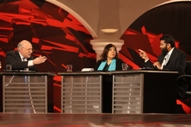 TIM SEBASTIAN
TIM SEBASTIAN
He says that all the past fatwas that prohibited the marriage of Muslim women to non-Muslim men were issued during periods in which there were political disputes between Muslims and non-Muslims.
YASIR QADHI
But Tim, that's his position, and the vast majority of Muslim scholarship disagrees with that.
TIM SEBASTIAN
What's wrong with that position?
YASIR QADHI
Because it goes against the Islamic unanimous consensus and according to ...
TIM SEBASTIAN
Well, it's clearly not unanimous, is it? I mean, there are other people who share his views.
YASIR QADHI
You're now discussing the minutiae of the methodology of Islamic law, and by and large once a unanimous consensus is established, it cannot be broken by a later position.
TIM SEBASTIAN
You really think that it's God's will, here and now, in the 21st century, that if a Muslim woman can find a happy, loving and respectful marriage with someone from a different faith, that God is saying to her she should give it up purely on religious grounds?
YASIR QADHI
I throw the question back at you, Tim, and say, what if she found a happy, loving..
TIM SEBASTIAN
Well, people aren't interested in my answer...
YASIR QADHI
I know but I'm broadening the issue.
TIM SEBASTIAN
That's why we asked you to come here and talk, because they're more interested in what you've got to say than in what I've got to say.
YASIR QADHI
I appreciate that, and that's why my voice is being heard, but what if I was to broaden the question and say, what if a woman finds this love and happiness in another woman...
TIM SEBASTIAN
Why do you find so much difficulty in answering this particular question?
YASIR QADHI
Because the point is very simple, it's a question of self-identity. If she wants to be a Muslim, she should follow the laws of Islam. If she doesn't want to follow the laws of Islam, she should not call herself a Muslim.
TIM SEBASTIAN
So better a Muslim marriage that falls apart, as so many do these days, than a happy and successful mixed marriage?
YASIR QADHI
Even though I'm from Texas, I don't follow the Bush doctrine of either with us or against us. There are many shades of grey in between.
TIM SEBASTIAN
I wasn't asking you for an either/or, but you know that many Muslim marriages end in failure.
YASIR QADHI
The solution is not to allow them to marry anybody whom they please. The solution is to re-educate them with the proper Islamic methodology..
TIM SEBASTIAN
If a Christian woman is married to a Christian man and she converts to Islam in the course of her marriage, is she supposed then to divorce her husband?
YASIR QADHI
This is an issue that has been disagreed upon in classical Islam.
TIM SEBASTIAN
Oh, so there is some give in the position?
YASIR QADHI
If a person converts after the marriage contract has taken place, there is leeway.
TIM SEBASTIAN
All right, Yasir Qadhi, thank you very much indeed.
YASIR QADHI
Thank you.
TIM SEBASTIAN
Let me please ask Muhammad Habash now to speak for the motion.
Muhammad Habash
Speaking for the motion
MUHAMMAD HABASH
Yes, yes. I believe Islam has given women full human rights, and respect her choice about her marriage. It's very clear in Islam there is no compulsion in religion. That means there is no compulsion in prayer, there is no compulsion in fasting, there is no compulsion in pilgrimage, there is no compulsion in marriage. Because of that, we believe the woman in Islam has a right to choose her spouse. In the same time, that doesn't mean we as a family or as a society has no responsibility, no moral responsibility, to advise her or to guide her or to lead her to the best situation. We have to remember that the Prophet Mohamed (peace be upon him) when he received a lady, Asma bint Yaszid ibn Al Sakan, she came to the Prophet Mohamed (pbuh) and she told him: "My father forced me to marry someone, and I don't like him." Prophet Mohamed said directly: "He has no right to force you, but this is your right." She said: "I agree with my father but I would like to show all women around the world that fathers have no right to force their daughters. This is our choice." This is what the companions of Prophet Mohamed (pbuh) around him tell us. At the same time we have moral responsibility to protect our daughters, to protect our sisters. If my daughter chose someone, some person on drugs, I have the right to reject this kind of marriage. I have a right to reject, I have a right to correct this kind of marriage, but even if I have a right to advise, I have a right to reject and even to boycott her, but I have no right at all to force her more than this. The situation of people of the scripture - non-believers or other religions - according to our faith in Islam, we believe that Islam came to confirm what came before, to continue what came before, not to cancel. In the holy Koran we can find 14 times, 14 times this phrase which means Islam came to continue what prophets came before, Islam came to continue, to confirm, not to destroy, not to abolish. With this situation I can tell you now, the non-believers or other religions, especially the people of the scriptures, we have to read in the holy Koran, people of the scriptures, they are not all alike..
TIM SEBASTIAN
Please come to an end, we're running out of time, thank you.
MUHAMMAD HABASH
Yes, but this point, they are not all alike, that means we have some difference between people who believe in God and people who don't believe in God. People who believe in Prophet Mohamad as a prophet or people who believe him as Satan, so we have a right to reject this kind of marriage, if the husband doesn't believe Prophet Mohamed as a prophet of God.
TIM SEBASTIAN
Muhammad Habash, thank you very much indeed. Aren't you treating Islam a little like a tree where you pick the fruits that you like and leave the ones that you don't?
MUHAMMAD HABASH
Look, let me give you ...
TIM SEBASTIAN
This is a central principle that you're ignoring. You ignore a few more central principles in Islam and what are you left with? You water down the religion, it's not going to exist anymore, is it? MUHAMMAD HABASH
MUHAMMAD HABASH
I'm not talking about the religion. It's not condition to leave your religion and to convert to Islam.
TIM SEBASTIAN
But you can't just pick and choose the bits that you like.
MUHAMMAD HABASH
Yes, but you have to be clear. As far as democracy is concerned, the President has to respect all faiths in his people. The President has to respect the faith of his people, so the husband has to respect the faith of all families, if he considers Prophet Mohamed (pbuh) as a liar, how can we agree with this kind of ...
TIM SEBASTIAN
But in a marriage issue, the family has rights as well, doesn't it? The family has a right to protect its reputation, its honour, its standing in the community, and marriage is central to all that, so aren't the wishes of the family even more important than one individual in that family? It might be 20 people, it might be a closed society. The only currency the family has is its honour.
MUHAMMAD HABASH
I'm talking about the family, about the society, that this is the common responsibility, moral responsibility for all.
TIM SEBASTIAN
But shouldn't the family have the right to limit the woman's choice?
MUHAMMAD HABASH
Yes, yes, I made this point, yes, I agree with this point.
TIM SEBASTIAN
Well, you're not challenging that at all. Are you on the right side of the debate?
MUHAMMAD HABASH
Yes, I am.
TIM SEBASTIAN
All right, Muhammad Habash, thank you very much. And now let me please ask Thuraya Al Arrayed to speak against the motion.
Thuraya Al Arrayed
Speaking against the motion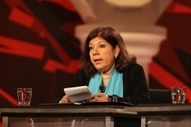
THURAYA AL ARRAYED
I'd like you all to read with me what is written there on the screen: ‘This House believes that Muslim women should be free to marry anyone they choose'. Each one of these words deserves a full consideration by itself for being included here. I am not going to speak on religious grounds, because I'm not an expert on that and my friend here took that point. I'm going to speak as a person, as a mother, as a woman, as an Arab who happens to be a Muslim, educated, studied education and is very much concerned with the consequences of the choices the individual makes on the rest of society, including the family. I have some points that I jotted down here that I would like to read for you, so I don't make any mistakes. Marriage is a crucial human relationship in which we hope to fulfil our dreams of happiness and life aspirations. Point number two: whether it is Muslim or non-Muslim, women or men, this statement holds true. Third: freedom is a beautiful concept, with hazy, sometimes conflicting definitions. I see it as a two-edged tool, that can, if used without skill or wisdom, hurt somebody. Freedom must have embedded controls against abuse or misuse or hurting others. Youths, generally under the age of say 25, 27, are not the most wise or experienced, just by fact of their age and their feelings. They go by attraction, which is usually evoked physically at that stage, and needs to be satisfied with the shortest possible wait. But marriage should not be limited to the role of a quick fix solution. It is important, it impacts more than the two individuals that are there involved in any individual choice. Its results are children, you get married and you have children, whether you thought about that or you didn't. Now, the children have the right to a nurturing life and society that accepts them. Sometimes the choices we make don't think of this long-range results on the children we bring into the world. Sometimes there are impacts on whose religion are they going to follow, the mother's or the father's? Sometimes there is a split on views of how to bring up the children. I think if you avoid these problems to start with, you are more likely to have a happier next generation in your own family. A marriage threatened by failure because it is crossing any boundaries or any differences between the husband and the wife is not ...
TIM SEBASTIAN
We're going to have to wind you up now please.
THURAYA AL ARRAYED
Yes, it doesn't have much of a chance for success, and a marriage that starts with a problem of displeasing somebody has to be defending itself forever.
TIM SEBASTIAN
All right, Thuraya Al Arrayed, thank you very much indeed. Your basic message to young people, and particularly young Muslim women, since that's who we're talking about, is 'Mother knows best', isn't it?
THURAYA AL ARRAYED
No.
TIM SEBASTIAN
That's what you seem to be saying.
THURAYA AL ARRAYED
No.
TIM SEBASTIAN
That they're young, they're ...
THURAYA AL ARRAYED
Mothers sometimes don't know best. Sometimes she has ...
TIM SEBASTIAN
Concentrating on physical attraction, and you need to have a say in the marriage.
THURAYA AL ARRAYED
That's a basic psychological concept. When you are young, it's your physical needs that drive you, and I think everybody agrees with me.
TIM SEBASTIAN
The mothers in Saudi Arabia aren't doing a good job, are they, because according to the Saudi Khalij Times in June 2006, the rate of divorce increased in the country by 20 per cent in 2003 alone.
THURAYA AL ARRAYED
Do you have any number for the rate of divorce in the Western world?
TIM SEBASTIAN
These are just as high, these are just as high.
THURAYA AL ARRAYED
OK, so it's equal.
TIM SEBASTIAN
In 2005 statistics from Jeddah courts show that 4,800 couples got married, 3,250 got divorced. 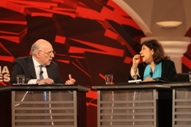 THURAYA AL ARRAYED
THURAYA AL ARRAYED
Fine, so I think the rate of divorce is rising in the whole world, not just in the Muslim countries.
TIM SEBASTIAN
So maybe the restrictions that are being put on Saudi women here and their choices of marriage are not leading them to a happy life, are they?
THURAYA AL ARRAYED
No, it's the rise of education in the Muslim women and in the Saudi women, in the Arab women, she now thinks that she has a role that is different. She doesn't want to be the one who sacrifices to make the ...
TIM SEBASTIAN
But if she is better educated than her parents, and in many cases she is these days, doesn't that give her the right to decide who she's going to marry?
THURAYA AL ARRAYED
Yes, provided, well, it's a two-sided issue.
TIM SEBASTIAN
She's got to keep her family happy, she's got to keep religion happy, she's got to keep the courts happy, the government happy. What about her?
THURAYA AL ARRAYED
You do not have one side decide for the other. It's an issue that both sides..it has to be a win-win situation. The family is happy and the young are happy. They think of their choice logically. The problem is when you are very young ...
TIM SEBASTIAN
So unless everybody wins, the woman in question can't.
THURAYA AL ARRAYED
No, she's included.
TIM SEBASTIAN
She's included, yes?
THURAYA AL ARRAYED
Of course.
TIM SEBASTIAN
But if she decides differently from the others? Too bad?
THURAYA AL ARRAYED
No, seriously...
TIM SEBASTIAN
Too bad.
THURAYA AL ARRAYED
Seriously, let me finish one statement..
TIM SEBASTIAN
You've finished many.
THURAYA AL ARRAYED
No, I did not. Usually you look, and this is another psychological concept. You look at the results afterwards and you think: "My God, if I had married that guy, what would my life have been?" and you feel so happy you listened.
TIM SEBASTIAN
OK, Thuraya Al Arrayed, thank you very much indeed. We're going to throw the matter open to the audience for your questions. The motion is: ‘This House believes that Muslim women should be free to marry anyone they choose' and I'm going to take a question from the lady in the third row there, yes, you.
Audience questions
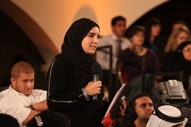 AUDIENCE (F)
AUDIENCE (F)
Hello. I'm a Palestinian from Seattle, Washington. Dr. Habash, you mentioned how, I quote: "It is not a compulsion to pray, not a compulsion to fast," et cetera and you also add that we should re-evaluate and take another look at the Koran and include people of the scriptures, i.e. Jews and Christians, under the group of people Muslim women should be allowed to marry. However, as Yasir Qadhi said, not only is there a unanimous consensus that it is essentially haram to do that, as Muslim women are only allowed to marry men of the Islamic faith. So how can you say that we should re-evaluate the word of God in a Hadith which specifically states we are not allowed to? Should we not rather choose to marry someone within the bounds set by our religion?
TIM SEBASTIAN
OK, let's get him to answer the question.
MUHAMMAD HABASH
Thank you. Let me explain something about this point. According to our tradition in Islam, we believe that there is a verse in the holy Koran (quotes a passage from the Koran in Arabic). That means it's forbidden to allow any mushrik (idol worshippers) to marry a Muslim lady. What does mushrik mean? That means those who attack us, those who are the enemy of us. So I told you according to the holy Koran, if you find some people of scripture, who believe in God, believe in Prophet Mohamed as good, as a prophet, this is enough. We don't need more. Those people which we read in the holy Koran ...
TIM SEBASTIAN
So you're saying the Koran is open to interpretation on this issue?
MUHAMMAD HABASH
Yes, yes.
TIM SEBASTIAN
Yasir Qadhi, do you agree with that?
YASIR QADHI
Well, I'd like to state here that this is a rather interesting position. So you're saying that there's this state between being a Christian and a Muslim, where there's a sympathetic Christian we're allowed to marry and an unsympathetic Christian we're not allowed to marry, is that your basic premise?
MUHAMMAD HABASH
No, no, let me explain more, please, one minute, to explain more about how we have to deal with others, with non-Muslims. The holy Koran said they are not all alike, they are not all alike. There are some of them you have to consider as a brother, as a friend, and there are some of them you have to consider as the enemy. So this is the question you have to ask: what exactly is your faith in Prophet Mohamed, what exactly is your faith in the Koran?
YASIR QADHI
With all due respect, Dr. Habash, if somebody believes in the Prophet Mohamed, that is a definition of a Muslim, so if a Christian says: "I believe in the Prophet Mohamed," he is a Muslim.
MUHAMMAD HABASH
No, there are alot who believe in the Prophet Mohamed who are of different religions...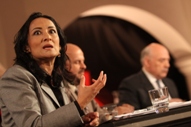 ASRA NOMANI
ASRA NOMANI
I just want to say that what we're witnessing here right now is a window into the exact debate that we need to be having. There is a side that is arguing for a literal interpretation of the Koran. Every religion has had this battle. Are we going to have a metaphorical, an historical interpretation of the Koran, or are we going to have very literal interpretations that say: ‘If you do this and only this, then you are a Muslim and you are acceptable'? This issue that we're talking about tonight has wide ramifications. How are we going to look at Surat Al Nisa'a 434 - the literal reading of which says that you can beat a wife lightly, if you add the parenthetical phrase; or that you should not - the other verse that says - you should not be a friend with the Jew and the Christian. This is why this kind of conversation needs to happen because this is the exact battle.
TIM SEBASTIAN
OK, all right, now I'm going to take the conversation back to the questioner and ask you whether you have got an answer that convinced you, did you?
AUDIENCE (F)
Not really, because I already know it's an established fact that the Muslim women cannot, and is essentially forbidden to marry non-Muslim men, and that's the case and I don't understand how he can go against the written word of God.
ASRA NOMANI
I mean, this is a battle we have though, because if we believe that there is unanimity - and there isn't, there is plenty of examples where there are dissenting opinions on every verse of the Koran including this important matter...saying that we have a majority and unanimity does not make it so.
TIM SEBASTIAN
OK, I'm going to take a question from the lady in the second row there. We'll get a microphone to you, please. Thank you.
AUDIENCE (F)
My question is to the opposition and in particular Mr. Yasir Qadhi.
TIM SEBASTIAN
Can you tell us where you're from, please.
AUDIENCE (F)
I'm from Qatar. If the word 'anyone' in the motion was changed to 'any Muslim man', would you be for the motion?
YASIR QADHI
I wouldn't be sitting on this side of the table, no.
AUDIENCE (F)
Thank you.
TIM SEBASTIAN
That's the only question you had? All right. Lady in the second row there yes. Where are you from, please?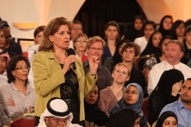 AUDIENCE (F)
AUDIENCE (F)
I'm from Syria. We're concentrating on the Muslim woman marrying a non-Muslim man, and I think the motion should extend to the fact, in most of our Arabic, sub-continent societies, she's not allowed to choose within the Muslim community. She is told who and where and what family and what level, et cetera.
TIM SEBASTIAN
So the restrictions are even greater than the motion implies?
AUDIENCE (F)
Much greater, much greater. And I think we need to expand the focus a little bit away from just Muslim versus non-Muslim.
YASIR QADHI
Can I comment on this?
TIM SEBASTIAN
Yasir Qadhi, let's have ...
YASIR QADHI
That's exactly my point. I agree with you 110 per cent. I'm the first person to agree with you, that there is too... there are not enough opportunities for Muslim women to express their own desires to get married. I'm the first person to agree with you about racial prejudice, tribal prejudice, ethnic prejudice, but the motion is as it is, and it's simply too broad. 'Anyone' and that includes non-Muslims and that includes people of the same gender. I'm living in Connecticut. Connecticut has just passed a same sex gender bill. I don't want Muslims marrying within the same gender, it's that simple.
AUDIENCE (F)
That's really too far away from the issue at hand.
YASIR QADHI
I'm sorry, the wording is quite clear, 'anyone'.
ASRA NOMANI
Right, but the point that I'd like to make is that as soon as you start deciding that you have the right to create barriers, you impinge on a woman's right to free will and my point is that it is not just about interfaith marriages. A Qatari can hardly choose to marry an Emirati man. I was told that, God forbid if I marry an African man or a black man, I mean, the prejudice in our community about who a woman marries extends beyond these interfaith issues..
TIM SEBASTIAN
OK. I want to hear from Thuraya Al Arrayed.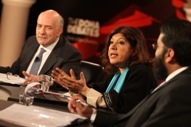 THURAYA AL ARRAYED
THURAYA AL ARRAYED
I think we are mixing here between what came with the religion and comes under the umbrella of being Muslims, and and what came with culture and social practices. For example a woman, a female, has the right of veto. Family cannot force her to marry according to their will, no matter what ...
TIM SEBASTIAN
We're now discussing being forced, we're discussing being prevented.
THURAYA AL ARRAYED
Yes. She can, under religion, she can say no, and nobody can make her marry her cousin or her neighbour, or the son of the ruler or anybody.
YASIR QADHI
Absolutely.
THURAYA AL ARRAYED
If she says no, it's no, but this is not practised.
ASRA NOMANI
Exactly the point. It's not practised.
THURAYA AL ARRAYED
We have to be clear on what is under the umbrella of religion or made to appear like it is under the umbrella of religion. The woman can choose.
TIM SEBASTIAN
(to the audience member) So which side of the umbrella are you?
AUDIENCE (F)
Myself?
TIM SEBASTIAN
Yes.
AUDIENCE (F)
Definitely with the motion.
TIM SEBASTIAN
OK. I'm going to take a question from the lady right at the back, yes, you. Thank you, we'll get a microphone to you. Where are you from please?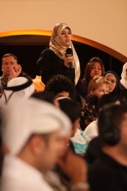 AUDIENCE (F)
AUDIENCE (F)
I'm from Lebanon. My question is for Dr. Thuraya. You stated that you believe that for.. (someone of my age), any marriage would be based on physical desire. You don't think that some ladies out there might actually be interested in..like thinking of raising a family, even at this age, with also balancing their educational career and everything?
THURAYA AL ARRAYED
I'm saying that the most active motivation at your age is physical, for both sexes. More for the men than for the women, so the attraction makes it look like the right person. "I would die if I didn't marry this person." And then you would die after you marry him within a period ...
TIM SEBASTIAN
Well, let's be fair, let's be fair, one or two work, don't they?
THURAYA AL ARRAYED
Well, I'm saying, the attraction makes it look like you would never forget the person, you would never ...
TIM SEBASTIAN
I mean, to listen to you, it's as if every marriage ends in doom and failure. It doesn't, does it?
THURAYA AL ARRAYED
Actually a lot of them do.
TIM SEBASTIAN
I want to hear back from the questioner.
AUDIENCE (F)
So, for instance I have in my life..like.. I know two young men. One who's very cute, another's very intelligent and smart, and has a very promising future, so..and I'm attracted to the cute guy..so would you think I would go for the cute guy just because I'm physically attracted to him or I would go for the smart guy? Because I want to secure a future.
TIM SEBASTIAN
She's asking for a little more credit.
THURAYA AL ARRAYED
Yes, no, no. No, actually it's on the subconscious level. It's never on the conscious level: "I like Mr. Muscle", you know. It's not like that. You convince yourself that he has some other aspect you like: "Oh, he's cute. He is so smart. He answers all the questions in the class. He's the son of so-and-so," but basically it's the physical attraction.
TIM SEBASTIAN
OK, all right, lady in the second row. Yes, you.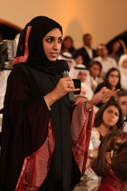 AUDIENCE (F)
AUDIENCE (F)
Hi, I'm from Qatar. I believe in freedom for women - my question is for Asra Nomani - but I also believe in, I believe in complete freedom for women, but I believe in appropriate marriages as well, and I think in Muslim societies we're very tight-knit, we're close with our families, we're close with our neighbours. So if the girl chooses to marry anyone she likes and she goes for a marriage that she knows is inappropriate but she says all she needs is love, all she needs is that she knows him. She's going to be isolated, she's going to be unhappy and the future consequences are going to weigh in a lot heavier than the actual immediate satisfaction of: "I married someone I love." What good is it that you're married to someone you love if your family's not speaking to you? What good is it, you're marrying someone you love if at the end of the day you can't... she herself will be embarrassed to be in that marriage because she knows it's inappropriate, because she knows it's not going to work, and she knows it doesn't fit in the context of the society, so how do you reconcile that?
ASRA NOMANI
So to me the reconciliation is not to limit a woman's free will then and to limit her choices. The reconciliation is for us as families to give women and to give each other unconditional love, to allow people their choices and let them be different, perhaps, allow yourselves to disagree. We're never going to agree on the choice, and the motion is not whether the woman has made a good choice. It is about her free will to make the choice, and I don't think the solution is to take away the woman's rights, but in fact for us to show the compassion, the kindness and the sense of justice that Islam is about, because to turn a daughter away is an act of cruelty, in my mind.
TIM SEBASTIAN
OK, Yasir Qadhi, you want to come in here.
YASIR QADHI
Nobody on this table is asking for women's rights to be taken away. Nobody on this table is asking for forced marriages. We're asking for limited responsibility within what the Sharia allows, it's that simple.
ASRA NOMANI
What I heard from you was that you said that if you don't accept these laws as you've prescribed them to be interpreted, then don't call yourself a Muslim.
YASIR QADHI
Don't ascribe the laws to Islam. I never said leave the faith. I said don't ...
ASRA NOMANI
You basically did the same kind of ideological intimidation that women face when they are turned away from their families. You said: "Leave then, don't call yourself a Muslim, if you don't follow the advice".
YASIR QADHI
The same applies to men. If a man wanted to marry another man, I'm not saying he's a non-Muslim, I say don't bring religion into it.
ASRA NOMANI
And this right should extend to men as well. I mean, too many men are also denied their right.
YASIR QADHI
The motion is too broad, it's that simple. We all agree that women should have more rights. The motion is too broad.
TIM SEBASTIAN
OK, we can all have a go at the motion but I want to go back to the questioner for a moment. Can I ask you, you're not married?
AUDIENCE (F)
I'm not married, no.
TIM SEBASTIAN
What factors will you weigh up when you make your decision to get married? Religion, family, government?
AUDIENCE (F)
Well, religion obviously for me, I will marry a Muslim. For me I want to marry from the Gulf, because I believe that cultures need to be similar. I feel that if I marry someone from a culture that is way too different, it's just going to be upsetting for everybody, including myself, because I'm very close with my family, I love my family and I want them to come and to receive me and my husband well. I don't want them to feel awkward.
TIM SEBASTIAN
And if you fell in love with somebody who wasn't from the Gulf, would you think it appropriate for the government to step in and tell you that you can't marry them?
AUDIENCE (F)
Well, what governments do is...for me the government is again a safety net as well. I don't think it's right for them to say ‘no', but at the same time I believe in taking responsibility for yourself and making decisions that you know are appropriate.
TIM SEBASTIAN
Thuraya Al Arrayed.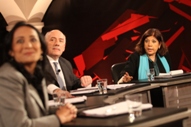 THURAYA AL ARRAYED
THURAYA AL ARRAYED
That's one sane young woman, I like what you say. I really like what you say. You know, every boundary or difference between the two sides of marriage creates problems, regardless of what you convince yourself. Language creates a problem, religion creates a problem, being from a different tribe creates a problem, being not liked by your family creates a problem. Now, if you want to stand up all your life defending your marriage against all these problems, you're not going to have a happy life.
TIM SEBASTIAN
So you're saying: "Choose the easy way out."
THURAYA AL ARRAYED
Choose the happy way out.
TIM SEBASTIAN
The happy way out and the easy way. OK. I think it's time we heard from a man. Gentleman in the fifth row. You, sir.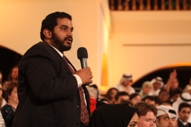 AUDIENCE (M)
AUDIENCE (M)
I'm from Egypt. I'm teaching at Qatar University, Islamic Studies. I think the topic is very, very general, OK, and if we are talking about the right of women to marry anyone, of course this is, no compulsion in it at all. Even if she...
TIM SEBASTIAN
Can we have a question please.
AUDIENCE (M)
No, no, even if she were to choose to be non-Muslim, I mean, if I have my child, and she decided to leave Islam, I don't have a right, in Islam, to force her to stay in the religion. So being.. to choose something less than that which is of course marriage, she has the right to do that, she has the right to choose whoever she wishes. However, by doing that she has to fulfil the criteria of being a Muslim, so you cannot have it both ways. You cannot have: "OK, I'm a Muslim but at the same time I'm not going to follow the rules of Islam." So either you follow the rules of Islam within these parameters, or you do what you like and there is no compulsion at the end of the day.
TIM SEBASTIAN
Muhammad Habash, you want to make a point here.
MUHAMMAD HABASH
Yes. I was talking about the religious issues. According to our understanding in Islam, we believe that Islam is a religion of all, the religion of all prophets - that means Christian and Jews can be Muslims but if they respect Prophet Mohamed (pbuh). According to my understanding we have to struggle against monopoly of salvation, we have to struggle against monopoly of God, we have to struggle against monopoly of reality. God is one but his names are many. Reality is one but its ways are many. Spirituality is one but religions are many. The love is one but hearts are many. With this situation, yes, I'm not looking to force others to convert to Islam, no, this is their choice, but I have to be clear. I cannot allow Islamic ladies to marry someone who believes their prophet is a liar. How can you find a good life with this? But if he said: "I'm ready to respect your life, to respect your religion, to respect your prophet, to respect your faith," I believe this is enough.
THURAYA AL ARRAYED
I'm sorry. This is not acceptable in Islam. She cannot marry a non-Muslim. Under Islam she cannot marry a non-Muslim. He has to become a Muslim. MUHAMMAD HABASH
MUHAMMAD HABASH
Now [if we had] some religious Christian leader here and if he said: "I'm ready to believe the Prophet Mohamed as a prophet of God," I believe this is enough. I'm not looking for more details..
YASIR QADHI
With all due respect that is exactly what I would say as well. You're on the wrong side of the table.
TIM SEBASTIAN
All right. I'm going to go to a gentleman in the second row in the blue shirt, please. You sir.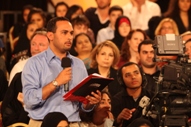 AUDIENCE (M)
AUDIENCE (M)
Hi, I'm Palestinian. Higher education continues to become more and more common across the region and women constitute a majority of consumers of higher education. If higher education opens and expands horizons, then how can we reconcile these expanded horizons with these glass ceilings that are placed in the name of religion?
TIM SEBASTIAN
Yasir Qadhi.
YASIR QADHI
Well, higher education of itself has nothing to do with definitions of religion. We will not change definitions of religion based upon higher education. If somebody doesn't want to believe in the Prophet Mohamed, he can have ten PhDs, he's not a Muslim. It doesn't matter..you're comparing apples and oranges. Islam has already been defined, and what I'm talking about are universals, not defined grey areas that us or others are bringing up, and under these definitions, a Muslim lady cannot marry a non-Muslim man, nor can she marry a lady. That's all I'm arguing for, and the motion is too broad.
ASRA NOMANI
The point here is not about the marriage of her choice. The point is whether she has the right to make her own choice, that is the motion. Is she free to make any choice that she wishes? Tell me, if your daughter one day comes to you and says: "I am going to marry a Christian man," what are you going to do? Are you going to jail her? Are you going to punish her, are you going to throw her out of the faith, or is she entitled as a human being to make that choice?
YASIR QADHI
I hope that the education I will give my daughter will obviously prevent her from doing that...
ASRA NOMANI
Let say it doesn't. What would you do?
TIM SEBASTIAN
Let him answer.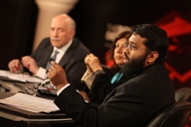 YASIR QADHI
YASIR QADHI
In the American context, there's nothing that I can do, but she will be educated enough to know that this is not a part of the religion no matter what she does.
ASRA NOMANI
That's a cop-out, that's a cop-out..
YASIR QADHI
Don't mix religion into her personal choice..
ASRA NOMANI
That's a cop-out because ultimately he isn't accounting for individual choice. You know, I want to say just very quickly to the young women in the audience, I don't go along with any of this belittling of your minds that's happening here. I find it offensive and I find it actually contrary to the teachings of the Prophet, because when young women came to him, he did not mock them, he did not ask them why they choose not to be in the marriages that they are wanting to leave. He respected and honoured their decision without any condition, and that conditionality is not ...
TIM SEBASTIAN
All right. Yasir Qadhi, do you want to come back on that?
YASIR QADHI
No conditions, there's no boundaries - no boundaries, there's no religion. It's that simple.
ASRA NOMANI
Free-will means that you have all the options, and that is what it means to be a human being.
YASIR QADHI
But not a Muslim. A Muslim needs to submit.
ASRA NOMANI
And what do you submit to?
YASIR QADHI
To the laws of God.
ASRA NOMANI
To your version of the laws of God. Thank you.
TIM SEBASTIAN
OK, I'm going to move on. Thank you, I'm going to move on. Lady in the second row there.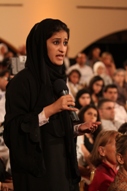 AUDIENCE (F)
AUDIENCE (F)
Hi, I'm from Qatar. This question is directed to Yasir Qadhi and Dr Al Thuraya. Islam is about ijtihad. On judgement day, a person will go and meet God and be judged on his actions and it seems like you put the blame on society and implications that come from within society and family that you seem to take all responsibility from the self, and I think the problem is that there is this clash between self and society that just simply can't be reconciled. So what would you say if a woman, you know, comes up and starts speaking and wants to get married and you tell her that you can't do it, because your family tells you that you can't do it because of your society. How is that person supposed to be a true Muslim?
THURAYA AL ARRAYED
What I wanted to clarify here is: Islam does not force women to marry people they don't want to get married to. The ones that do this are individuals, and the individuals are what makes the society, and when the majority of the individuals in the societies submit to wrong actions, to their own children, men and women, that's when things go wrong. It is not religion that makes it wrong. It's the way the people understand it and apply it. I personally married a man I chose, from a different country. The two families did not think much of our choice and we stood up for it, but it took a lot, a lot of real hard work to make it acceptable to the families, and not to complain because it's our own choice and it could have fallen through.
TIM SEBASTIAN
So you're glad you didn't take your families' word straightaway?
THURAYA AL ARRAYED
I think I would not want any daughter of mine to go through the trouble of trying to make it work all the time. Go with the family, because they love you.
TIM SEBASTIAN
But you stood against the families.
THURAYA AL ARRAYED
No, I didn't.
TIM SEBASTIAN
And made it work.
THURAYA AL ARRAYED
No, I did not.
TIM SEBASTIAN
You just said you did.
THURAYA AL ARRAYED
I did not go against the family, because when I chose ...
TIM SEBASTIAN
You said your families weren't impressed with the decisions.
THURAYA AL ARRAYED
May I finish? They didn't know the young man like he was next door and they know his background and his past history so they can say yes or no. They were worried about my choice and they had the right to be worried.
TIM SEBASTIAN
This gets more and more intriguing, but I want to go back to the questioner in a moment.
AUDIENCE (F)
I mean what I'm trying to say is that sometimes religion is about faith, you really can't prove it, other people can't feel it, but you know it's there and it's a conviction that you have, and sometimes when you feel that the person is right for you, you know, it's worth fighting for it, and I don't think that you as a family should take that responsibility, that if the person who's been graced with the free will to do it...
THURAYA AL ARRAYED
Why would it have anything to do with religion? If he's the right person for you, the family ...
AUDIENCE (F)
I didn't say it's about religion, but I mean it's similar to religion because that's what faith is, isn't it?
THURAYA AL ARRAYED
Fine, faith in the man or faith in your religion? I must have lost something there.
TIM SEBASTIAN(to the audience member)
You talked about the clash between society and self. Is this something that you yourself have experienced, or you've seen this?
AUDIENCE (F)
Well, I mean as a graduate from an American university and as a citizen of Qatar, I go through it every day. I mean, cultural clashes are everywhere. It is up to you to reconcile them, but I mean, you know, you have faith in yourself that you have the ability to make the decision, and the fact that I will not go to my mother and I will not go to my father to tell me what the right decision is, because I as a person value my decisions.
THURAYA AL ARRAYED
When you reach your mother and father's age, you will understand what they are telling you now.
TIM SEBASTIAN
OK. Mother knows best. Right, gentleman in the fourth row there.
THURAYA AL ARRAYED
You will have more experience.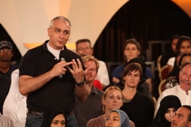 AUDIENCE (M)
AUDIENCE (M)
Hello, I'm Syrian. My question is really to the forum over here is, why are we trying to force a kind of a bi-polarity on an issue which really is not that prevalent. Yes, cleric Yasir mentioned that the question is really too wide and we've been fighting on a number of different issues. It is the social context, it's the cultural context that plays an issue. The reality is, we need to sort of focus on the fact that it's extremely difficult to choose an issue of marriage. What we all need to look at is how to help people choose. I think no-one should be doing it alone. God knows, I made a few mistakes in my life..
TIM SEBASTIAN
OK, that's not quite the issue we're talking about. The gentleman behind you, two rows behind, you sir. Yes.
AUDIENCE (M)
Good evening. I have three questions.
TIM SEBASTIAN
No, just one, thank you. And tell us where you're from. 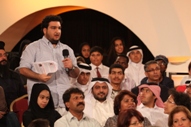 AUDIENCE (M)
AUDIENCE (M)
All right. Well, I'm Lebanese and I'm a Christian and I will address the cultural debate that's been going on. Where I come from, society in Lebanon is much more lax than let's say in the Gulf, and so many individuals, men and women from different faiths have, you know, been getting married to each other, and it hasn't been much of an issue, and I think the reason for that is because of culture, and for Dr. Thuraya, as a psychologist, you should know that problems of individuals, you know, spread out the society, and society is made up of individuals, so don't you believe that if you have a problem with society and culture, it is your job as a psychologist in a society to correct these cultural problems in order for the individual to live, you know, in a better way and to have more freedom than to just say: "No, we'll have the easy way out."
TIM SEBASTIAN
OK, thanks.
THURAYA AL ARRAYED
No, I didn't say ... He said you'll have the easy way out (pointing to Tim Sebastian) ... I didn't say that. I said there are ways to make your life happier, if you don't look for a problematic situation to start with. And then spend your time, you know, working on being happy with each other, rather than facing the problems of convincing everybody your choice was right, you were correct. You want to make sure they see it your way and it's very difficult. To go back, I'm not a psychologist. Actually I'm a long-range planner, so I know what ‘future' means. You do not make a decision on the basis of now, because in the future you will face the consequences. You want to get married and she's in front of you. She has the basic qualifications. That is not enough because in the end you have to live with other things. You have to live with her parents, it's a package deal, you have to live with everything. In fact what you said about changing the society is true, but you don't do it one by one, it has to be enough change in the whole thinking.
TIM SEBASTIAN
Thank you, Thuraya Al Arrayed.
MUHAMMAD HABASH
I have a comment. I believe we have to separate between two kinds of societies. There are some societies [where] there is enough tolerance to find positive results with this kind of inter-marriage. For example during the life of Prophet Mohamad [pbuh], we find Prophet Mohamed [pbuh] had two wives from the Christians but it was very, very important step and [there was] a very positive result [from] this intermarriage. The situation in Arab countries and the situation of Muslims outside of Arab countries, I believe this is the... the marriage has to find enough harmony, has to find enough similarity in the culture, similarity in the understanding...
TIM SEBASTIAN
So you would support the kind of situation that our guest was describing in Lebanon? MUHAMMAD HABASH
MUHAMMAD HABASH
Sometimes we find in Lebanon for example that marriage between Sunni and Shia is very, very important, the marriage between Sunni and Shia in Lebanon is very, very important. Now there are 200,000 marriage situations in Lebanon between Sunni and Shia. It can help us to find unity in our country, to find unity in Lebanon and to make people more understanding [of] each other. But the situation of religion... I believe we cannot call for this without good faith, without good respect to other faith, to say: "I'm ready to respect your Prophet, respect your God, to respect your holy books," and in this point I believe we can call for this kind of intermarriage.
TIM SEBASTIAN
OK, I'm going to take a question from the lady at the back, if we could get a microphone to you, please.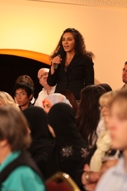 AUDIENCE (F)
AUDIENCE (F)
I'm Arab/American. My question is for the two guests against the motion. You seem to be undermining the effect of women, Muslim women being the mothers for instance, of the next generation. If they even marry, so when I marry a Christian, why deny the effect it would have on my children as a Muslim woman, even if I married a non-Muslim, for instance, and I have a question actually like actually a judicial question: if a Muslim woman married a Jew, for instance, from the Jewish perspective, the kids are not Jewish because it's matrilineal, so if by that definition a Muslim woman is to have these kids, they should by default be Muslim. On the other hand if a Muslim man marries a Jewish woman from a Jewish point of view, they are Jews because the mother is Jewish and it's matrilineal, whereas from the Muslim side they will be perceived as Muslims, right, because the man is Muslim.
TIM SEBASTIAN
All right, you're coming to a question?
AUDIENCE (F)
So the question is, if we're going to go into these very judicial religious circles, wouldn't the way out for those for the motion to have a complete civil, secular discussion of this kind of marriage?
TIM SEBASTIAN
Yasir Qadhi.
YASIR QADHI
Well, it's quite simple. You're trying to rationalise the law and then do away with it, and you can't do that. When the law has come, when you believe in a religion, like Dr. Thuraya said about something else, it's a package deal. When you believe in this religion, you cannot start tinkering with it.
AUDIENCE (F)
So I cannot rationalise...I have to have belief only..?
THURAYA AL ARRAYED
I have a correction here...
TIM SEBASTIAN
Can Yasir Qadhi finish his answer please.
YASIR QADHI
With this issue, of course there's a wisdom and that is that any Muslim man will respect the prophets of the Jews and the Christians because they are their prophets, but it's not vice-versa. Of course there's a wisdom, but the wisdom is not the law. The wisdom is derived from the law, it doesn't change the law, so the law is there and the law is explicit that a Muslim lady cannot marry a non-Muslim man. Whether that wisdom exists in a particular marriage or not is not the point. The law is already there.
TIM SEBASTIAN
OK, I don't want to spend a lot of time on this.
THURAYA AL ARRAYED
In fact that's one of the reasons where a Muslim woman is not supposed to marry a non-Muslim man, because the children follow the father. They will not become, if she marries a Christian, they cannot claim, you know, except by...they follow the father.
TIM SEBASTIAN
I'm going to move on to the lady in the front row, please. Send a microphone down, or around, please.
AUDIENCE (F)
My question is for ...
TIM SEBASTIAN
Where are you from?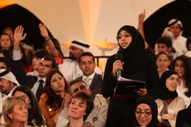 AUDIENCE (F)
AUDIENCE (F)
Pakistan. As an individual, my choice is hindered by a lot of external forces, and I'm sure like you cannot be naïve enough to think that when a marriage is going to fail or is in a turbulent state, that I will also turn to other people. Now, if I have chosen my husband by myself, and I have no-one to turn back to, how do I prevent this from happening, if my family has abandoned me, my culture is no longer accepting me, if my government is no longer my safety net, who do I turn to to help me get through this marriage?
ASRA NOMANI
I think that we're operating in this debate with a lot of myths. We're operating with the myth that religion is passed on simply through the father. We're operating on the myth that ...We're stating in this conversation many points as if they're fact, and I hope and I know and I have confidence in you that we're not here to debate whether a Muslim woman has to choose Yasir Qadhi's version of Islam. I mean, this is what's set up at the table, and this is not the point. The point is ...
TIM SEBASTIAN
You're never answering her question. You're not actually coming to her question. Please could you get to her question.
ASRA NOMANI
Yes, I will. The point is that also is a false assumption, because if we argue that the family is what props up the marriage, in fact the family can oftentimes be a pressure on women to stay in very miserable situations, and so this assumption that the family always saves the marriage and saves the health of the woman, is a false one.
TIM SEBASTIAN
It saved you, didn't it, your family, your father?
ASRA NOMANI
My father helped me in my case.
TIM SEBASTIAN
Yes, so it worked with you. (To the audience member) You're worried about this issue, aren't you, not having the safety net, aren't you, if you turn your back on your family. ...
AUDIENCE (F)
If I have no-one to turn to, who will help me through this? Your father helped you but who would help me if my family is no longer there, or anyone for that matter. Who do I turn to? I would cry myself to sleep every night then.
ASRA NOMANI
My belief is that we have to challenge this idea that the family is not there. I mean, this is my fundamental point is that we need to practise our Islam in our families with this concept of benevolence and of mercy and compassion and kindness, so that no matter what your choice, your family is there. We have to reject this idea that the family has an option to walk away, because ...
TIM SEBASTIAN
But a lot do, don't they, a lot do, and she's afraid. (To the audience member) Have you seen this happen in other instances? Have you seen women who are abandoned by their families?
AUDIENCE (F)
Not personally but this is no utopian society. I'm sure it happens and you cannot disregard those individuals to whom it happens, ask them what they feel like.
TIM SEBASTIAN
OK. I'm going to take a question from the lady in the back row, one from the back, yes, you.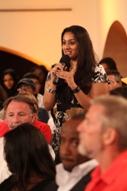 AUDIENCE (F)
AUDIENCE (F)
Good evening. I'm from India, and my question is directed to Dr. Thuraya and Yasir Qadhi. My question is that, considering that Muslim women are not just bound by religious laws but by cultural practices as well; also considering that Muslim women nowadays are very well educated and exposed to different cultures. Let's assume a situation where a Muslim woman of marriageable age has found certain Muslim men, or one Muslim man who is well-educated, in a very financially well-off position, smart, intelligent etc., all qualities very compatible that she finds, and can she gather courage to go and at least initiate a conversation with her parents, with her family, saying that: "Here I have found a person, not found basically but there is a person like this who I have met, and if by your kind permission or if you think it's best for me, can you think of this person for me as a potential or a suitable husband for myself?" Can she, can there be participative decision-making from the girls today of Muslim society - that's my question.
THURAYA AL ARRAYED
This happens all the time, all the time. If they tell you the girl doesn't go and tell her mother: "I've found the right person, if he comes, would he be acceptable? Could you convince my father?" This happens all the time, and if her choice is right, she gets the green light.
YASIR QADHI
And in fact the first marriage of the Prophet Mohamad with Khadijah was exactly the same way. She was the one interested in him, so we're not disagreeing with these issues. Once again, the motion is too broad. We all agree for women to do this.
ASRA NOMANI
What also happens is that the mother says: ‘Your father will have a heart attack if you bring that person home', and that then limits the woman's choice.
AUDIENCE (F)
Yes, because even today I have personally heard many Muslim friends of mine saying that they wouldn't dare to go and tell their parents or even discuss such sensitive issues, because they still consider it extremely sensitive, extremely culturally different, or you know, taboo, to go and raise such sensitive matters to their father. Maybe to their mother, yes, they're really close, but do they need to have an intermediary even today to talk such, you know, important but personal matters to even their own parents or brothers who are finally the decision-makers?
YASIR QADHI
Religiously of course they don't, and that's the whole point. Our job, my job as a Muslim cleric, like I said, is to re-educate our people about the reality of our religion. It's not to discard it, it's to rediscover it, that's what I said.
TIM SEBASTIAN
OK, we've done that issue. I'm going to take a question from the lady at the back there please.
AUDIENCE (F)
Good evening. I'm Muslim and I'm a young woman, I'm educated as you say, I've been educated by my ...
TIM SEBASTIAN
Where are you from please? AUDIENCE (F)
AUDIENCE (F)
I'm from Mauritius. I've been educated by my parents. I've been brought up within the Muslim culture, and I find it extremely frustrating that you are underestimating our intelligence to such an extent that you believe that we, as young Muslims, cannot be responsible for our choices. We have been educated by our parents in the Muslim religion and therefore we should be able to make our choice in a responsible manner according to what we have been taught and what we believe is true.
TIM SEBASTIAN
Yasir Qadhi.
YASIR QADHI
I didn't say that. I'm talking about the perspective of religion.
THURAYA AL ARRAYED
I heard you and you speak very well. If you make the right choice, you get the green light. The family does not say no. If you made the right choice, they will not fight you.
AUDIENCE (F)
You are assuming that the family is intelligent enough to respect our choice.
THURAYA AL ARRAYED
Here it's the family differences, even in the same country, even under the same religion. One family does, one family doesn't. It has nothing to do with the religion.
TIM SEBASTIAN
Can you address her point, which was, what if the family doesn't make the right decision?
THURAYA AL ARRAYED
What is the right decision, to agree with her? And why not? What is the right decision? That they agree with your fight.
AUDIENCE (F)
When I was growing up, my father said to me: "You make your bed and lie on it."
THURAYA AL ARRAYED
Exactly.
AUDIENCE (F)
So I believe that I make decisions for which I am responsible, and my father trusted me to make the right decision. However, had he not been that enlightened, then I am sure, being the person I am, I would have gone against his decision, because I know that I am responsible and educated enough to bear the consequences of my decision, and I believe that as a Muslim, we are free and I'm tired of hearing people saying that Muslim women have no rights, etc. etc. etc. We do. We're intelligent enough, we are educated enough, why shouldn't we have the right to make our own decisions?
THURAYA AL ARRAYED
I agree. I am a Muslim woman. May I respond to that. Thank you. I'm also a Muslim woman and I don't think I'm dumb. I'm not saying Muslim women are dumb and cannot make their choices. I'm saying, if you have a conflict with the family, one side is right, one side is wrong. You are better off if you listen, so that your life is easier, as he said, and happier and has less conflicts for you and for the poor guy that you want to get married to.
MUHAMMAD HABASH
I have some comment to make about this point exactly. The marriage in Islam is not just like a relationship between two persons, this is the relationship between two families, two societies, so it's not... we cannot speak about comprehensive freedom to choose. We have a right, as a father, as a mother, as a society, as parliamentarians, we have a right to understand exactly how it's gone.
YASIR QADHI
I'd just like to add here, this motion is very emotional and it's very complex and it's pretty obvious to all of us here that each one of us has a unique position. However the verdict goes, I'm happy we started the conversation.
ASRA NOMANI
I just want to say that the point is that none of you as women I hope will ever believe that you're alone. You have at least in me an aunty who will come to your wedding, if you decide to do something ...
TIM SEBASTIAN
That's a lot of weddings.
ASRA NOMANI
I know. Because it's going to take courage, it's going to take courage on individual levels to challenge so many of these traditions that decide they are going to control women and patronise them and diminish their intellect in the minds of society.
TIM SEBASTIAN
OK, woman in the seventh row, lady in the seventh row, please. Yes, you.
AUDIENCE (F)
I'm a Muslim girl and I shall love and choose ...
TIM SEBASTIAN
From where?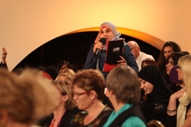 AUDIENCE (F)
AUDIENCE (F)
I'm from Egypt, and choose my husband that my heart would want me to. And so what if I [choose] this non-Muslim man? If he really loves me and wants to share the rest of his life with me, and you know, he can change his life to join Islam, and for protection, you don't need any protection from anywhere, just Allah will protect them, because it's the right thing. They might have [a lot of] resistance, but noone can stop them because noone can stop their love. It's strong enough. My question is if I can change a non-Muslim man to a better way or not.
TIM SEBASTIAN
Yasir Qadhi.
YASIR QADHI
We all agree if a person accepts Islam, of course, and if a person is managing to convert another person before their marriage, of course. My position, which is a position of mainstream Islam which unanimously has been agreed upon - it's not my interpretation - is that a Muslim lady cannot engage in an Islamic marriage contract with a non-Muslim man. If he says the shahada, if he says: "I testify there is one God and Mohamed is his Prophet," he's a Muslim, so the marriage can take place.
ASRA NOMANI
No matter how many times he says it, I can guarantee you that marriages from Toledo to New York City to Delhi are happening in that way.
YASIR QADHI
Civil marriages...
ASRA NOMANI
No.
YASIR QADHI
Not religious. ASRA NOMANI
ASRA NOMANI
No. Through Muslim clerics, because this idea that is coming from that side is the exact ideology that wants us all to think the same. It wants us all to interpret Islam according to their rule-book, and our challenge as human beings is to use our minds, to be able to say: "What is best for myself?" Because God is the judge, not individuals.
TIM SEBASTIAN
OK, I'm going to take a question from the lady in the second row.
AUDIENCE (F)
Good evening, I'm from Pakistan. Miss Asra said at the beginning of this debate and I quote: "Parents need to say to their daughters that we will honour your choice." My question is what exactly defines those choices, what exactly are the boundaries for those choices? To put my question into perspective, my grandmother was married when she was 13 years old. She was given the choice of marrying her cousin who she did not really like, and another man whom she was attracted to. The choices were limited. She was young, you know, there wasn't enough passion to help her decide, and there weren't enough choices as well, so how exactly does a Muslim woman brought up in a conservative Muslim society, you know, face up to her choices?
TIM SEBASTIAN
OK, all right, thank you.
ASRA NOMANI
You know, the Prophet Mohamed told us to seek a fatwa from the heart when it came to issues of conflict. So often we are told what to think and for me, you know, I believe that choices can mean anything. It can mean deciding that you want to marry your cousin and this cousin over that cousin. I mean, it doesn't mean that you have to marry outside what your community would accept. It does take courageous individuals to change society and to bring about social change, so ultimately the motion here is about whether you just have that right to make your own choice. It's not limited at all.
TIM SEBASTIAN
OK, Yasir Qadhi, I want to just bring you in, very quickly.
YASIR QADHI
Asra. Frank question: would you allow a Muslim lady to marry another lady?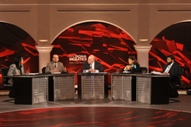 ASRA NOMANI
ASRA NOMANI
Ultimately the point is that it is her choice..
YASIR QADHI
OK, that's all I wanted to know.
ASRA NOMANI
What I think...
TIM SEBASTIAN
Very briefly.
ASRA NOMANI
You didn't answer what you would do if your daughter insisted on marrying a Christian man, because ultimately they don't want to take responsibility on the other motion for what the consequences are.
TIM SEBASTIAN
OK, I'm just going to take one more brief question, the gentleman in the fourth row, you sir. 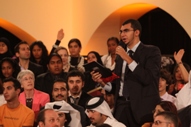 AUDIENCE (M)
AUDIENCE (M)
My question is for Mr. Yasir. You must have said this like ten times through the debate: everything that you said, you said because of unanimous consensus, and at the beginning of the debate you mentioned that unanimous consensus was the strongest tool of making Sharia law or Islamic rules. Correct me if I'm mistaken, I'm a Muslim myself and I've studied just a tiny little bit of Islamic law, and according to what I've studied, the priority is Koran, Haddith, precedent and then unanimous consensus. So when you say unanimous consensus, can you define what is unanimous consensus? How many people have to agree to something, and is there any way you can count or ...?
YASIR QADHI
This is a very good technical question about the intricacies of Islamic law and I have no problems expounding on it.
TIM SEBASTIAN
Well, he wants to know what's behind your decisions.
YASIR QADHI
OK. Unanimous consensus is stronger than an interpretation of the verse of the Koran, because it shows that everybody has understood that verse the same way. That's why unanimous consensus is considered to be stronger than any interpretation. As for unanimous consensus - how it's defined - it's defined where each and every of the major scholars of any time period have agreed about the same ruling, and to be honest, there's not that many decisions that are unanimously agreed upon. Of them, according to five authorities that I have here, which are going to be too troublesome to mention, of them is the fact that a Muslim lady cannot engage in a marriage contract with a non-Muslim man at that time.
AUDIENCE (M)
You're saying that at the end of tonight, if 70 per cent of people in this room vote yes for the motion, that's a unanimous consensus?
YASIR QADHI
No, unanimous means there is unanimity, that means everybody agrees with it, and once unanimous consensus has been reached, it cannot be abrogated after that.
TIM SEBASTIAN
(Pointing to Muhammad Habash) Well, the man who reads Friday prayers at the Al-Zahraa mosque in Damascus doesn't agree with you.
YASIR QADHI
Well, actually he has a position which is kind of, sort of in between and I don't quite understand it myself.
Vote result
 TIM SEBASTIAN
TIM SEBASTIAN
OK, we could go on for hours on this, but we have come to the point where we're going to vote on this motion, that ‘This House believes that Muslim women should be free to marry anyone they choose'. Would you please take your voting machines and let me explain how they work. If you want to vote for the motion, that is the side represented by Asra Nomani and Muhammad Habash, you press button 1, the ‘yes' button. If you want to vote against the motion, the side represented by Yasir Qadhi and Thuraya Al Arrayed, you press button 2, the ‘no' button, and whichever one you want, would you press it now please. You only have to press once. Thanks to modern science, your vote will be communicated to the computers and we should have the vote for you in about 20 seconds. Just a reminder that this debate is going to be shown on BBC World News on June 6th and 7th. Please do watch along with that. The exact times are in your information pack, and during the long, hot summer, please do follow along with our website, there'll be a lot of new material and we're always glad to hear from you, your suggestions and your observations. Right, there is the vote. The vote is 62 per cent for the motion, 38 per cent against. The motion has been carried. All it remains for me to do is to thank our distinguished panellists very much for coming here tonight, thank you very much. To you, the audience as well, thank you for your questions and participation. The Doha Debates will be back again in October. Till then, have a good summer and a safe journey home. Thank you very much for coming, thank you. Good night.
Watch online

